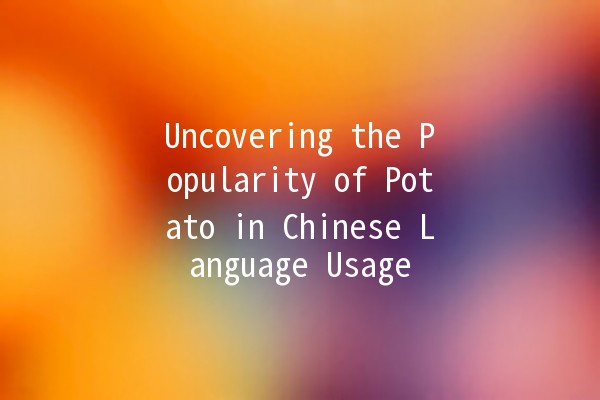The Chinese language is rich and diverse, encompassing a wide range of expressions, idioms, and colloquialisms. In recent years, there has been a fascinating trend around the term "potato" (土豆), which has increasingly entered the vernacular of Chinese speakers. This article explores the various factors contributing to the popularity of "potato," particularly as it relates to cultural references, slang, and its impact on social media and language learning.
The Rise of Potato in Popular Culture
The potato, known as 土豆 (tǔdòu) in Chinese, is a staple food in many households across China. Its versatility in cuisine and its affordability contribute to its widespread popularity. Often used in dishes ranging from stirfries to soups, the potato's culinary significance has made it a talking point in various foodrelated discussions.
Example: A popular dish called "土豆丝" (tǔdòu sī), or shredded potatoes, has become a goto recipe among home cooks, leading to many online cooking tutorials and forums discussing its preparation.

With the rise of social media platforms like Weibo and Douyin (TikTok), expressions involving "potato" have gained traction. Users often employ the term humorously, using it to describe people or situations in a lighthearted manner.
Example: The phrase "我是土豆" (wǒ shì tǔdòu), which translates to "I am a potato," is often used to convey feelings of laziness or lack of motivation, resonating with a younger audience looking for relatable content.
Connecting with Language Learners
In language education, food terms are typically introduced early due to their relevance and familiarity. The term "potato" serves as an engaging entry point for learners of Mandarin. Teachers often use foodrelated vocabulary to create a lively learning environment.
Example: A beginner class might incorporate recipes and cooking videos that feature potatoes, allowing students to practice language skills while learning how to prepare popular dishes.
Interestingly, "potato" has also made its way into Chinese slang. It is sometimes used as a playful insult, describing someone as unremarkable or foolish. This playful connotation shows how language evolves as communities adopt and adapt terms.
Example: In casual conversations, someone might say, "你真的是个土豆" (nǐ zhēn de shì gè tǔdòu), meaning "You're really a potato," to tease a friend about a silly mistake they made.
Cultural References
The digital landscape is fertile ground for meme culture, and "potato" has found a niche in various memes circulating within Chinesespeaking communities. These memes often depict absurd or exaggerated representations of potatoes, contributing to humor and relatability among netizens.
Example: A viral meme featuring a cartoon potato with a confused expression might be captioned with a humorous question, prompting shares and discussions that embed the term deeper into everyday vernacular.
The Global Perspective
As globalization continues to blur cultural lines, culinary exchanges have also influenced language. The potato has appeared in numerous international cuisines introduced to Chinese diners, further embedding the term into contemporary discussions of food.
Example: Fastfood chains have introduced varieties of potatobased products, leading to discussions about their popularity in comparison to traditional Chinese meals. This has sparked debates online about cultural fusion and the evolution of taste.
: The Language of Food
The term "potato" in the Chinese language encapsulates the interaction of culture, humor, education, and modern media. Its growing popularity among various demographics emphasizes the dynamics between language and society, revealing how simple terms can evolve and adapt to changing contexts. Embracing this linguistic phenomenon can enhance cultural understanding and foster engagement among speakers and learners alike.🥔
FAQs
The popularity of "potato" in Chinese slang can be attributed to its effective use as a humorous term. It is often employed to describe individuals jokingly, particularly those who display laziness or a lack of motivation. This entertaining application resonates with younger audiences, who regularly engage in playful banter on social media platforms.
Potatoes are integral to many Chinese dishes, making the term familiar and commonly used among speakers. This culinary relevance leads to its frequent inclusion in conversations about food, enabling learners of Mandarin to connect language acquisition with practical usage in reallife scenarios.
Absolutely! Food terms, like "potato," are relatable and often easier for learners to grasp. They not only enhance vocabulary but also provide context for learners through recipes, culinary videos, and cultural discussions, establishing meaningful connections that can motivate further study.
Social media platforms have transformed the way language evolves and spreads. Terms like "potato" are shared widely, generating new meanings and usages that quickly permeate various communities. This rapid dissemination enables contemporary language to reflect current trends, interests, and humor.
Yes! Numerous resources cater to learners seeking to incorporate food vocabulary into their studies, including cooking blogs, YouTube tutorials, and language learning apps specializing in culinary terms. These resources offer practical applications of vocabulary, making learning more enjoyable and engaging.
The connotation of "potato" can vary. In some contexts, it is used affectionately and humorously, while in others, it can take on a more mocking tone. Understanding the context of a conversation is crucial for interpreting the meaning behind the term when used in social situations.
By examining the multifaceted aspects of the term "potato" in the Chinese language, we gain insight into the interplay between culture and language. The rise of "potato" reflects how language evolves, allowing us to connect and communicate in increasingly meaningful ways.